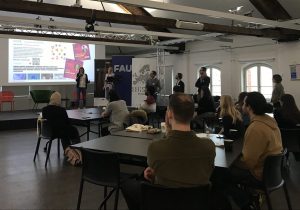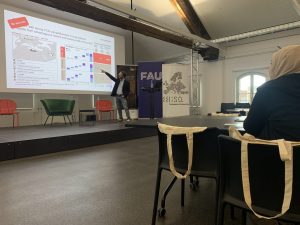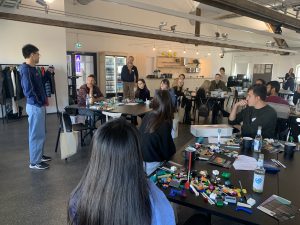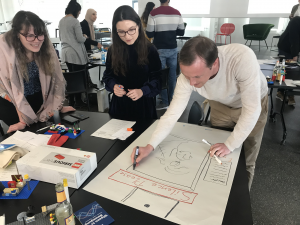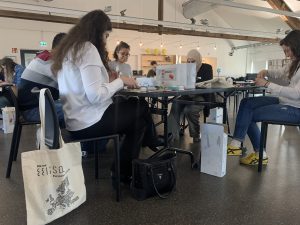PhD students discover potential for innovation in their research
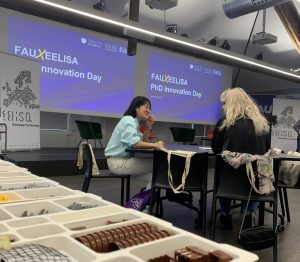 Not just a PhD project, but also a business idea? On the first EELISA PhD Innovation Day Doctoral students at FAU and EELISA partner universities had the possibility to discover how much potential there is in their own research topic. The full-day workshop was held by FAU’s spin off services team and the FAU-EELISA team on March 27, 2023. Is the research topic suitable for a start-up? What potential buyers would the product have? And when is the best time to apply for a patent? In addition to three personal success stories of FAU spin-offs by former doctoral students, innovation experts also worked with the participants on the first steps to their own business idea.
Not just a PhD project, but also a business idea? On the first EELISA PhD Innovation Day Doctoral students at FAU and EELISA partner universities had the possibility to discover how much potential there is in their own research topic. The full-day workshop was held by FAU’s spin off services team and the FAU-EELISA team on March 27, 2023. Is the research topic suitable for a start-up? What potential buyers would the product have? And when is the best time to apply for a patent? In addition to three personal success stories of FAU spin-offs by former doctoral students, innovation experts also worked with the participants on the first steps to their own business idea.
Dr. Daniel Teichmann completed his doctorate at FAU on the topic of “Conception and evaluation of a sustainable energy supply based on liquid hydrogen carriers (LOHC)”. During his doctorate, he developed a technology for the transportation and storage of hydrogen, based on which he founded the start-up Hydrogenious Technologies GmbH in 2012. Meanwhile, Handelsblatt counts Hydrogenious among the 11 german start-ups that could achieve Unicorn status – a start-up valued by investors at at least $1 billion. Dr. Berthold Melcher – Technology Manager at Hydrogenious – explained how the idea was born and how the start-up became so successful. “Be bold, be accurate, demonstrate your idea and what you are doing”, he advised the more than 20 international doctoral students.
Let’s build Lego!
Afterwards, the participants tested for themselves how to vividly represent their idea. Under the guidance of Klaus Konrad and Lisa Drescher from FAU’s spin off service, the participants used Lego to build themselves, their goals and their research topic.
“With the Lego Serious Play exercise, doctoral students visualize their research in concrete terms instead of always presenting it with PowerPoint presentations,” Lisa Drescher explains the purpose of the exercise. “This can also create concrete images of the future after the PhD and provide direction.” Using guidelines and looking at personal goals, possible target groups and benefits for the market, the participants then presented their Lego projects to the group.
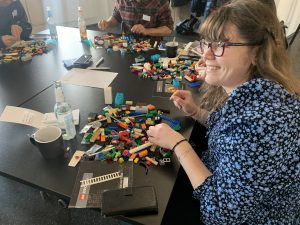
Also using a Lego model, Dr. Nico Ploner and Frederik Kaul, co-founders of Acalta GmbH, introduced themselves. With their start-up, the FAU-trained medical doctors have developed a platform to digitize everyday life in clinics and medical practices. Here, too, the basis was a scientific paper on the subject of exchanging medical data. They reported on dos and don’ts in the innovation process, which they themselves had learned from the start-up consulting team. “Take advantage of what your universities have to offer in the area of founding and entrepreneurship, take everything you can,” they recommended to the participants.
“Our Idea was born in the beer garden” – Acalta
Martin Golze then presented one of these offers. He advises on knowledge transfer, patents and intellectual property at FAU and gave the participants tips on the legal steps and basics.
Dr. Niklas Duda, founder of the startup Dulog, encouraged people to simply try out their own idea. “If you have an idea that could become a business, try it out with a pilot customer. Does it work? Great, you now have a business. And if it doesn’t work? Great, you still learned a lot.” As part of his doctoral research on “resource-limited mobile sensor nodes with vital sign sensing and contact detection,” he developed an extremely lightweight bio-logger – a small device that attaches to small animals to collect data on their movement patterns. He currently works part-time for
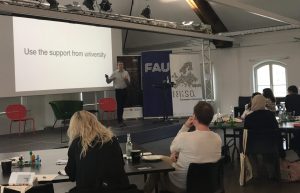
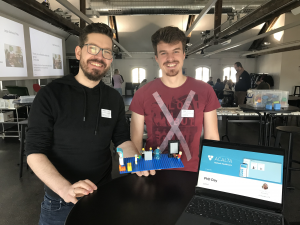
This is the way from technology to your business idea
In four steps, Judit Klein, Head of Startups at the ZOLLHOF Tech Incubator in Nuremberg, explained how research and a technology like Niklas Duda’s sensor becomes a product on the market. What functional added value does your technology offer? What problems could it solve? Which of those problems does it solve most efficiently and best fit the team’s capabilities? Who uses the technology, who pays for it, and who decides whether to use it?
Three words to describe the event: “collaboration, communication and open-mindedness”
” I’ve been thinking a lot about how to turn knowledge into innovation. And if I want to develop my research into a product, I must start doing it right away,” said Maritza Salcido at the end of the event. She is a doctoral student in the Department of Educational Psychology and Excellence Research at FAU. “So I have to go out very early, start networking and see if it works.”
Ionela Irimescu learned about the event through the EELISA network and, together with eight colleagues, traveled all the way from Bucharest to attend the workshop. She is doing her PhD in biophysics at the Technical University of Bucharest (UPB) and was also able to take a lot from the workshop for her PhD project: “It’s my first year as a PhD student and I think now I have much more confidence that everything will go well because everyone here is doing well.”
“We wanted to offer an event for FAU and EELISA PhD students to help them look beyond their research. Not every alumnus has to become a founder in the end, but the mindset of an entrepreneur is useful for further life: for example, customer centricity, mindfulness, prototyping, efficient use of resources and the importance of a fitting team,” explained Melanie Viebahn. She is responsible for innovation and entrepreneurship activities in FAU’s EELISA team and organized the workshop together with FAU’s spin off service.
Article by Johanna Hojer
You want more impressions of the PHD Innovation Day?
Then check out FAU’s EELISA Instagram account.


